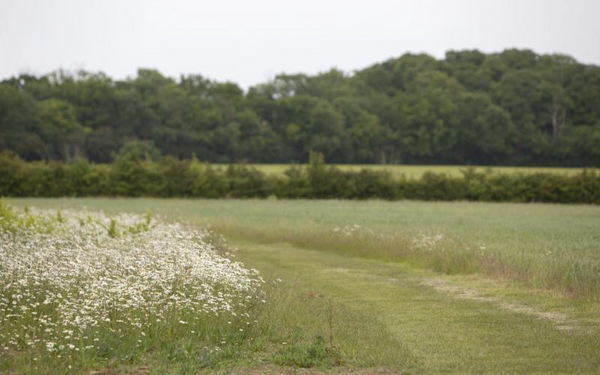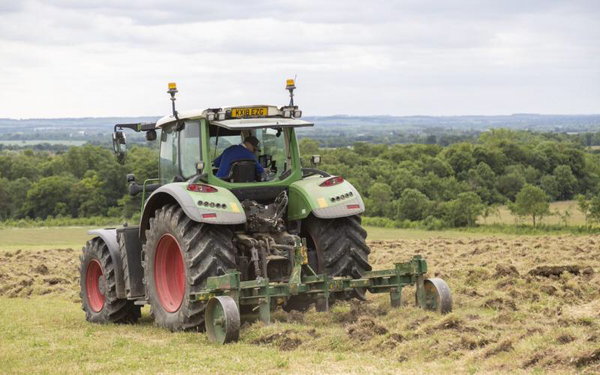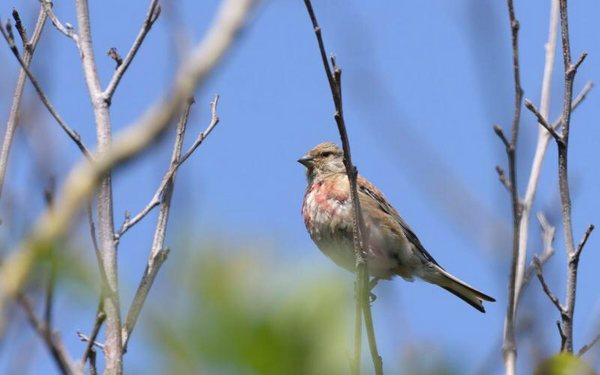- Shop
- Recipes
- About
- Sign in
-
Shop
-
Recipes
-
About
July 28, 2020
| The National Trust began converting its Home Farm at Wimpole Hall to organic production methods in 2009. Farm Manager Callum Weir explains how this aligns with Wimpole's long history and sustainable future. The Home Farm grows rye, naked barley, carlin and blue peas for us. |
Farming and agriculture has long been an important part of the history of Wimpole. It was only a few months ago, during excavations of our new car park, that we unearthed a deity of the Celtic god Cernunnos. Cernunnos was the Celtic good of fertility, livestock and wild things. An example of how those farming at Wimpole nearly 2,000 years ago realised for food production to be sustainable, it needed to work with the natural environment.
1,600 years later in 1790, the 3rd Earl of Hardwicke, Philip Yorke asked Sir John Soane to do something quite outside the remit of an influential architect and design and build him a modern Home Farm.
The model farm was built to demonstrate to the best farming practices to tenants. This was through some form of benevolence as famine was a real risk at the time, but probably primarily because rent was paid through production so the better his tenants were at farming, but the more the Earl earned!
These new practices, termed the ‘high farming’ movement include rationalising land holdings, undertaking enclosure, improving drainage, introducing new crops and rotation systems, experimenting with animal breeding, employing machinery and erecting new, purpose-designed farm buildings.
At Wimpole, this involved introducing peas and beans into the cropping rotation. The 3rd Earl recognised that these crops improved the fertility of the soil which boosted the production of crops. This allowed the farm to support more livestock, whose manure added further to the soil fertility. A truly circular farming model.
The 3rd Earl even tried carrots to see if they would succeed on a soil deemed ‘so utterly improper for that root’; they succeeded well, and produced a full crop, but the yield could not be ascertained due to people stealing them!
However, it was not all about production for the 3rd Earl. He understood the value of workers, without which the richest soil is not worth owning. As noted in a popular book at the time, Lord Hardwicke has set an example worthy of imitation, in having built several comfortable cottages, and having attached gardens to them; some few other gentlemen have done the like, but, it is to be lamented that it is only a few’. Lord Hardwicke ‘encouraged his poor to make the most of their gardens by giving a premium to the best manager of them’. He even gave out engraved watches to the best ploughman – which is not something the National Trust would do, even if I was any good at ploughing!
The 4th Earl of Hardwicke, Charles Yorke, continued this passion for agriculture on the estate, and was described by his peers as a keen agriculturalist (I guess that is the name you call someone who likes farming, but can’t be called a farmer for fear of social exclusion!). Such was his passion that he was a founding member of the Royal Agricultural Society, and was its president in 1843. In that same year Queen Victoria and Prince Albert visited the estate. Queen Victoria noted in her diary that Albert very much enjoyed being shown the various types of ploughs at Home Farm by the Earl.
Charles Yorke was also the MP for Cambridgeshire, where he rather publicly fell out with the Prime Minister at the time Sir Robert Peel over the repeal of the Corn Laws and resigned from cabinet. He said in Parliament ‘certainly no county in England was more distinguished for its skill and improvements in agriculture’, and as a result he could not support any threat to Cambridgeshire’s farming heritage. In fairness to the Earl, 12 years after his resignation he admitted that he had ‘formed a wrong opinion on the subject’ – how refreshing to have such honesty from a politician!
In 2009, the National Trust made the decision to start farming 1,500 acres of the 2,500 acre Wimpole Estate in-hand. The farm was converted to organic and the first tractor and plough were purchased. The reasons for this decision because in 2008, there was a bet going round – £20 to whoever can find a worm. The soils were tired, overworked and lifeless after a model which focused on production, resulting in exploiting soil as a medium to grow crops, rather than an asset with multiple, complex functions. This seemed wrong; it went against the ethos of sustainable food production that had been at the core of all those who had farmed at Wimpole over thousands of years; from the Celts to the Hardwickes. The National Trust wanted to address this, but at the time, none of the local farmers or local contractors wanted to be seen to farm organically, so we had to do it ourselves.

But after five years of organic farming, things had already started to change. The mass of carbon stored in the soils at Wimpole had increased by 10%, and the estate had moved from a net source of greenhouse emissions to a net sink. Ten years on and I will pay you £20 if you don’t find a worm - we now average of 9 worms per spade-full. These undervalued animals are crucial in recycling crop litter into valuable nutrients and, as you can see, improving soil structure. This surprising pace of change shows that the task ahead of restoring a beautiful and natural environment is not too daunting – we can make significant change to our environment if we really want to.
Today, the purpose of the farm is still to demonstrate sustainable land management and farming to our supporters and those we seek to inspire. That’s what the 3rd Earl built the farm to do. However, our audience is a bit larger and includes 350,000 Wimpole visitors a year, National Trust farm tenants, politicians, civil servants and industry leaders.
500 acres of the farm is Grade 1 listed parkland, which is grazed by our traditional, rare-breed livestock. The livestock help us deliver floristic diversity in our parkland, a key priority as the UK has lost 95% of its flower-rich meadows, as well as providing us with an income stream as their meat is sold in the Estate’s restaurants and shop. The rest of the land is 1,000 acres of organic arable production. On the arable land we grow crops like wheat, barley and beans, as well as trialling novel or historical crops like quinoa and Carlin peas. As part of our farming enterprise, we have a significant environmental Higher Level Stewardship scheme (worth £80,000 per year) which helps us deliver habitats such as 35km of hedges and 150 acres of field margins.

We engage with our visitors and supporters about the farm’s purpose on the property and through social media, and we our finding our audiences are becoming increasingly engaged and interested in sustainable food production. We also work with a variety of social groups. An example of this is our Farming Memories group, which is a group of people who used to work in agriculture, but now suffer with dementia or Alzheimer’s. This group regularly visit the farm and relive memories of their past. Here is more information about that group.
The livestock element of our business is core to the Estate’s visitor offer, but our arable farm is more about engagement with the agricultural sector. We do this through the FABulous Farmers project which is an EU Interreg project which looks at promoting the principal of the circular economy in agriculture. The National Trust is the project lead in the East of England region. Within the first 12 months of the project, we have advised over 30 farmers about adopting more climate-smart, nature-friendly farming practices. As part of the project, we use our 1,000 acre organic arable farm to demonstrate that this type of farming is profitable by paying a market rent to the Estate, as well as delivering and measuring many of the public goods such as;
You can find Callum and regular updates from the farm on Twitter here

This short film shows a little more of Wimpole and Callum's work on the farm:
January 23, 2026
Hodmedod's pop-up Shop! will be open again on Saturday 7th February alongside Barleybird's annual Seed Swap.
August 14, 2025
Hodmedod co-founder Josiah Meldrum describes how Hodmedod emerged from the question of whether we can reliably and sustainably feed ourselves.
August 13, 2025
Our new organic naked fava beans and yellow peas can be used just like split beans and peas - there are just a few intact whole pulses that will generally split in half when soaked and cooked. But why are some of our beans & peas now naked?
Get in touch at hello@hodmedods.co.uk or 01986 467567
Things sometimes go wrong but we'll always do our best to put it right. Please contact us to let us know if there's any problem with an order.
For further details please see our Terms of Service, Returns, Refunds and Exchanges Policy and Privacy Policy.
Sign up for our latest news, recipes, offers & more…
By signing up, you agree to receive marketing emails. Please see our Privacy Policy for more details.
Registered in England and Wales as Hodmedod Ltd, The Studios, London Road, Brampton, Beccles, Suffolk, NR34 8DQ, UK; company number 08151811.
